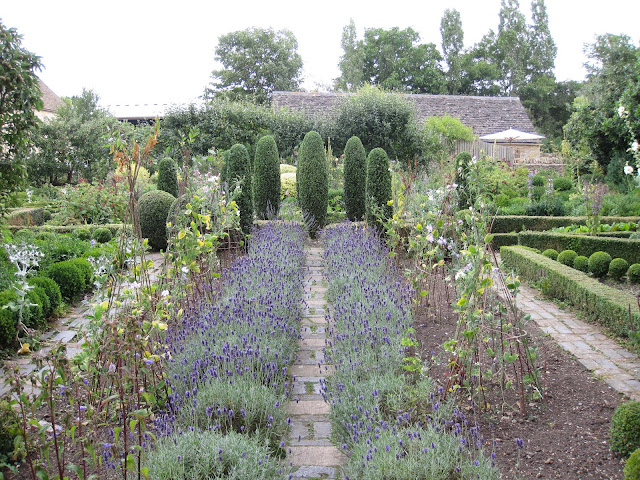Barbara Paul Robinson
A Book Talk
Tuesday, December 11, 2012
New York Horticultural Society
A Book Talk
Tuesday, December 11, 2012
New York Horticultural Society
Rosemary Verey
Barbara Paul Robinson spent one month interning with Rosemary Verey at Barnsley House in 1991. For the next 20 years, she called Verey every Sunday. That's what I call staying in touch. I wondered how many gardeners are still "in touch" with Verey's style.
Robinson began her talk by quoting Verey, "It's a sin to be dull" and Robinson held out the hope that she like Verey would not be. Robinson was as charming as her mentor. But no amount of wit and humor, could convince me that Verey's legacy is one we can learn from.
Three years ago, I spent three months in the UK on my own kind of apprenticeship at two famous gardens. I made a list of must see gardens to visit, before I left. Barnsley House, Verey's garden, was not on my list. As it turned out, Barnsley House was on the road to another more important garden, so I made a turn off the main road and pulled into the car park at Verey's house.
Sitting on the terrace, in the now high-end hotel that Barnsley House has become, on a sunny day, with a cup of excellent tea in my hand, I looked around at Verey's garden. I had a feeling that the plantings were only a shadow of the garden that Verey had created and become famous for. Robinson confirmed this. Showing slides of Verey's garden in its heyday, Robinson expounded on its features and the distinctly human scale of the garden. This was not a palace or a castle. It was a garden of tasteful perennials, formal walks, architectural features and its world-famous potager.
Verey's star started to wane in the nineties. However, she remained famous in America until the end of her life. Robinson explained this phenomenon with a quote from Dan Hinkley, "Rosemary Verey fortified our self-esteem." Two days before I came back to the states from my UK garden adventure, I swore I would never deadhead another plant as long as I lived. I have embraced the American love for watching the demise of all things horticultural.
Robinson began her talk by quoting Verey, "It's a sin to be dull" and Robinson held out the hope that she like Verey would not be. Robinson was as charming as her mentor. But no amount of wit and humor, could convince me that Verey's legacy is one we can learn from.
Three years ago, I spent three months in the UK on my own kind of apprenticeship at two famous gardens. I made a list of must see gardens to visit, before I left. Barnsley House, Verey's garden, was not on my list. As it turned out, Barnsley House was on the road to another more important garden, so I made a turn off the main road and pulled into the car park at Verey's house.
Sitting on the terrace, in the now high-end hotel that Barnsley House has become, on a sunny day, with a cup of excellent tea in my hand, I looked around at Verey's garden. I had a feeling that the plantings were only a shadow of the garden that Verey had created and become famous for. Robinson confirmed this. Showing slides of Verey's garden in its heyday, Robinson expounded on its features and the distinctly human scale of the garden. This was not a palace or a castle. It was a garden of tasteful perennials, formal walks, architectural features and its world-famous potager.
Verey's star started to wane in the nineties. However, she remained famous in America until the end of her life. Robinson explained this phenomenon with a quote from Dan Hinkley, "Rosemary Verey fortified our self-esteem." Two days before I came back to the states from my UK garden adventure, I swore I would never deadhead another plant as long as I lived. I have embraced the American love for watching the demise of all things horticultural.











 snap du jour (photo blog)
snap du jour (photo blog)





1 comments:
kate spade uk
louis vuitton outlet online
christian louboutin shoes
louis vuitton outlet
levis 501
coach factory outlet
buy red bottoms
louboutin shoes
birkenstock uk
ralph lauren outlet online
pandora charms outlet
true religion jeans outlet
nike free flyknit 3.0
true religion sale
cheap nfl jerseys
coach factory outlet online
ugg sale
michael kors outlet online
jimmy choo shoes
louboutin shoes
oakley sunglasses
nike free flyknit 5.0
michael kors outlet clearance
jimmy choo outlet
oakley sunglasses outlet
supra shoes
uggs on sale
ray ban sunglasses
adidas nmd
burberry outlet online
asics gel nimbus
canada goose uk
coach outlet online
nike free flyknit 3.0
christian louboutin shoes
air force 1
chaussure louboutin
201684yuanyuan
Post a Comment